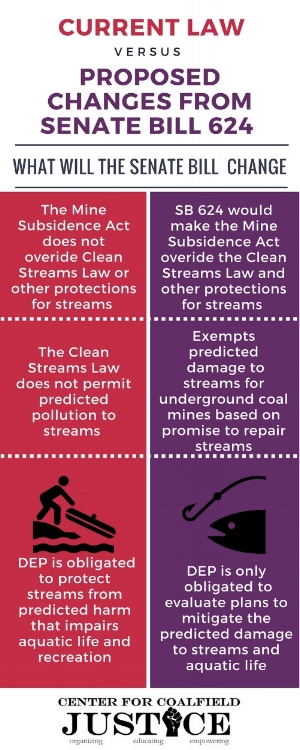Senator Joe Scarnati and Senator Gene Yaw introduced Senate Bill No. 624 (SB 624) last month, and it is now before the Environmental Resources and Energy Committee. SB 624 proposes amendments to the Bituminous Mine Subsidence and Land Conservation Act (commonly referred to as Act 54 or the Mine Subsidence Act). Senator Scarnati’s Chief Counsel, Drew Compton, recently acknowledged that SB 624 is in direct response to the permit appeals filed by CCJ and Sierra Club that are currently pending before the Environmental Hearing Board (“EHB”). SB 624 comes on the eve of a decision from the EHB and is a blatant 11th hour attempt to bypass the authority and expertise of the Environmental Hearing Board Judges.

Pennsylvania has a detailed statutory and regulatory scheme in place to protect streams – the Clean Streams Law and the regulations promulgated thereunder. Section 9.1(d) of the Mine Subsidence Act expressly requires underground coal mine operators to comply with the Clean Streams Law. It is hardly extraordinary that industries and individuals in Pennsylvania must comply with multiple laws.
Currently, Section 5(e) of the Mine Subsidence Act does not override the Clean Streams Law and other legal authority that protect streams in Pennsylvania. In fact, Section 5(e) does not even mention water resources. Section 5(e) imposes obligations on underground coal mine operators that were not previously imposed by the Mine Subsidence Act. The Generally Assembly required mining companies, through the permitting process, to adopt technologically and economically feasible measures to prevent material damage to surface structures when planning to mine coal underground. Therefore, Section 5(e) limits a mining company’s obligation to provide protection for surface structures to economic and technologically feasible means, but it does not guarantee a mining company an absolute right to longwall mine coal where that mining would violate other applicable provisions of Pennsylvania Law – and for good reason.
The goal of Senate Bill No. 624 is clear: revise Section 5(e) and 9.1(d) to say that nothing in these subsections, statute, or any other statute enacted by the Generally Assembly was intended to prohibit or restrict longwall coal mining in Pennsylvania. The proposed revisions seek to drastically change the Department’s express authority and obligation to protect against predicted flow loss in streams.
Currently, the Department is obligated to protect a stream’s aquatic life uses and the community’s ability to use and enjoy the stream from predicted harm. SB 624 seeks to limit the Department’s authority in the longwall mining context to evaluating post-mining stream mitigation plans when total flow loss is predicted by the applicant. Under SB 624, the Department’s primary and almost exclusive obligation would be to require operators to mitigate predicted harm after it occurs rather than preventing the predicted harm from occurring in the first place. Not so surprisingly, Consol advanced this interpretation of the Department’s duties in the pending permit appeals before the Environmental Hearing Board.
At the heart of the pending appeals and SB 624 is whether Consol’s right to longwall mine trumps the protections set forth in the Clean Streams Law, the mining regulations, and Article I, Section 27 of the Pennsylvania Constitution. We believe that Consol’s right to longwall mine coal should not trump your right to go fishing on a beautiful morning or enjoy a quiet walk along a stream, particularly when reasonable alternatives exist that would protect your rights.

